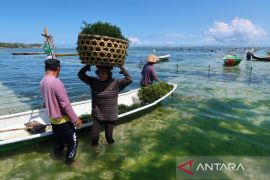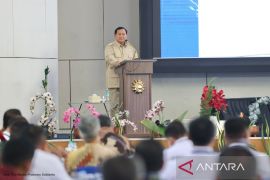"Reclamation also threatens the safety of the Unitary State of the Republic of Indonesia, as the police and naval patrols cannot go close to the land. Moreover, no one controls the islands, as they do not have administrative units," Ridwan Saidi saidJakarta (ANTARA News) - In an archipelagic nation, with thousands of islands scattered across the ocean, the presence of the coastal community, mainly comprising traditional fishermen, is crucial to help protect its sovereignty.
Hence, Jakartas traditional fishermen should be viewed as more than just underprivileged inhabitants living in slum areas in the modern capital city, as they are also the nations assets that help guard the countrys territory.
From this perspective, the governments decision to cancel one of the reclamation projects in the Jakarta Bay area has been lauded by several parties.
"I agree with the decision taken by the coordinating minister for maritime affairs, but I think it is not enough. The entire reclamation projects should be stopped as they threaten the Peoples Total Defense and Security (Hankamrata) system," Ridwan Saidi, a prominent resident from Betawi (indigenous Jakarta) community, stated at a press conference, in Jakarta, recently.
Reclamation usually includes relocation of the local coastal inhabitants, and this is a threat to the Hankamrata system, former lawmaker Saidi noted.
The coastal community helps to protect the national sovereignty and territory, he pointed out.
"Reclamation also threatens the safety of the Unitary State of the Republic of Indonesia, as the police and naval patrols cannot go close to the land. Moreover, no one controls the islands, as they do not have administrative units," he added.
Furthermore, the project could also eradicate the civilization on Seribu (One Thousand) Islands and close access to historical sites on the Islands, he added.
The Jakarta Bay reclamation project has become controversial after a bribery case concerning the mega project came to light, and demonstrations against the project were staged by fishermen and the urban poor affected by it.
Calls to halt the reclamation project have been voiced by various parties, including Vice President M. Jusuf Kalla, Maritime Affairs and Fisheries Minister Susi Pudjiastuti, and Environmental Affairs and Forestry Minister Siti Nurbaya, as well as by several legislators and NGO activists.
On June 30, Minister Ramli announced the cancellation of the G Island reclamation project in Jakarta Bay, saying that its implementation was a serious offense.
The project would endanger the environment, sea traffic, and vital projects, Ramli informed the press.
"The joint committee of ministers agrees that the G Island reclamation project is a serious offense," Ramli stated.
Ramli noted that the project being developed by PT Muara Wisesa Samudera, a subsidiary of PT Agung Podomoro Land, was categorized as a serious offense, as the state electricity company PT PLNs electrical cables ran under the island projects site.
"The island would also hinder the movement of fishing vessels. Before the island was made, fishing boats could easily reach Muara Angke, but now, fishing vessels have to make a detour, costing them more fuel," he pointed out.
Based on the joint committees analysis, the G Island has been arbitrarily built, and it would damage the environment and harm the marine biota, the minister said.
It was also decided that during the implementation of C, D, and N island projects, some moderate offenses had been committed by the developers and were required to only conduct minor repairs and dismantling.
The C and D islands, which are almost a single land mass, need to be separated by a canal that is at least 100 meters wide and at least eight meters deep to facilitate the movement of vessels.
The N island, which is part of the Kalibaru port project of state-owned port operator Pelindo II, was considered to be a technical environmental offense.
"The developer has agreed to mend the damage, so the implementation of the project is allowed to continue," Ramli affirmed.
Marine and Fisheries Minister Susi Pudjiastuti stated that all members of the joint committee had applied their respective skills and had taken the best possible decisions.
Reportedly, Jakarta Governor Basuki Tjahaja Purnama (Ahok), who has pushed the construction of the reclamation projects in Jakarta Bay, was not happy with the ministers move to cancel the G Island.
Ahok sent a letter to President Joko Widodo, questioning Minister Ramlis statement at a recent press conference announcing the cancellation of the reclamation project.
The reclamation was carried out based on Presidential Decree No. 52/1995, so only the president could cancel the project and not a minister, Ahok claimed.
In response, Ramli said certain ministers have the authority to cancel the reclamation project that has violated the existing regulations.
"Every minister has the authority that is protected by the law. For instance, a seaport comes under the authority of the transportation minister, maritime areas fall under the authority of the maritime affairs and fisheries minister, while matters related to environment come under the authority of the environmental affairs and forestry minister," Ramli stated.
The minister was taken aback by Ahoks reaction, which he considered as "mushy" for complaining about the matter to the president.
In the meantime, Justice and Prosperous Party (PKS) has asked the government to empower fishermen affected by Jakarta Bay reclamation projects.
"Fishermen as a grassroots community are the legitimate owners of coastal regions, so they need to be given long and short-term economic empowering programs," Ledia Hanifa Amaliah, head of the manpower, farmers and fishermen affairs of PKS, said in a statement.
The implementation of the G Island reclamation project had forced local traditional fishermen to travel a longer distance to fish, she noted.
She also urged the government to restore the ecosystem damaged by the reclamation projects in northern Jakarta.
Besides, she called on the Jakarta Legislative Council (DPRD) to issue a regional regulation on reclamation that is in favor of traditional fishermen.(*)
Reporter: Fardah
Editor: Heru Purwanto
Copyright © ANTARA 2016









